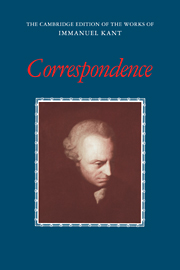Book contents
- Frontmatter
- Contents
- General Editors' Preface
- Acknowledgments
- Introduction
- Letters before 1770
- Letters 1770–1780
- 1770
- 1771
- 1772
- 1773
- 1774
- 1776
- 1777
- 1778
- 1779
- Letters 1781–1789
- Letters 1790–1794
- Letters 1795–1800
- Public Declaration concerning Fichte's Wissenschaftslehre, August 7, 1799
- Biographical Sketches
- Glossary
- Index of Persons
1772
from Letters 1770–1780
Published online by Cambridge University Press: 07 September 2010
- Frontmatter
- Contents
- General Editors' Preface
- Acknowledgments
- Introduction
- Letters before 1770
- Letters 1770–1780
- 1770
- 1771
- 1772
- 1773
- 1774
- 1776
- 1777
- 1778
- 1779
- Letters 1781–1789
- Letters 1790–1794
- Letters 1795–1800
- Public Declaration concerning Fichte's Wissenschaftslehre, August 7, 1799
- Biographical Sketches
- Glossary
- Index of Persons
Summary
Noble Sir,
Esteemed friend,
You do me no injustice if you become resentful at my total failure to reply to your letters; but lest you draw any disagreeable conclusions from it, let me appeal to your understanding of my turn of mind. Instead of excuses, I shall give you a brief account of the sorts of things that have occupied my thoughts and that cause me to put off letter-writing in my leisure hours. After your departure from Königsberg I examined once more, in the intervals between my professional duties and my sorely needed relaxation, the project that we had debated, in order to adapt it to the whole of philosophy and the rest of knowledge and in order to understand its extent and limits. I had already previously made considerable progress in the effort to distinguish the sensible from the intellectual in the field of morals and the principles that spring therefrom. I had also long ago outlined, to my tolerable satisfaction, the principles of feeling, taste, and power of judgment, with their effects – the pleasant, the beautiful, and the good – and was then making plans for a work that might perhaps have the title, The Limits of Sensibility and Reason. I planned to have it consist of two parts, a theoretical and a practical. The first part would have two sections, (1) general phenomenology and (2) metaphysics, but this only with regard to its nature and method.
- Type
- Chapter
- Information
- Correspondence , pp. 132 - 138Publisher: Cambridge University PressPrint publication year: 1999
- 1
- Cited by

